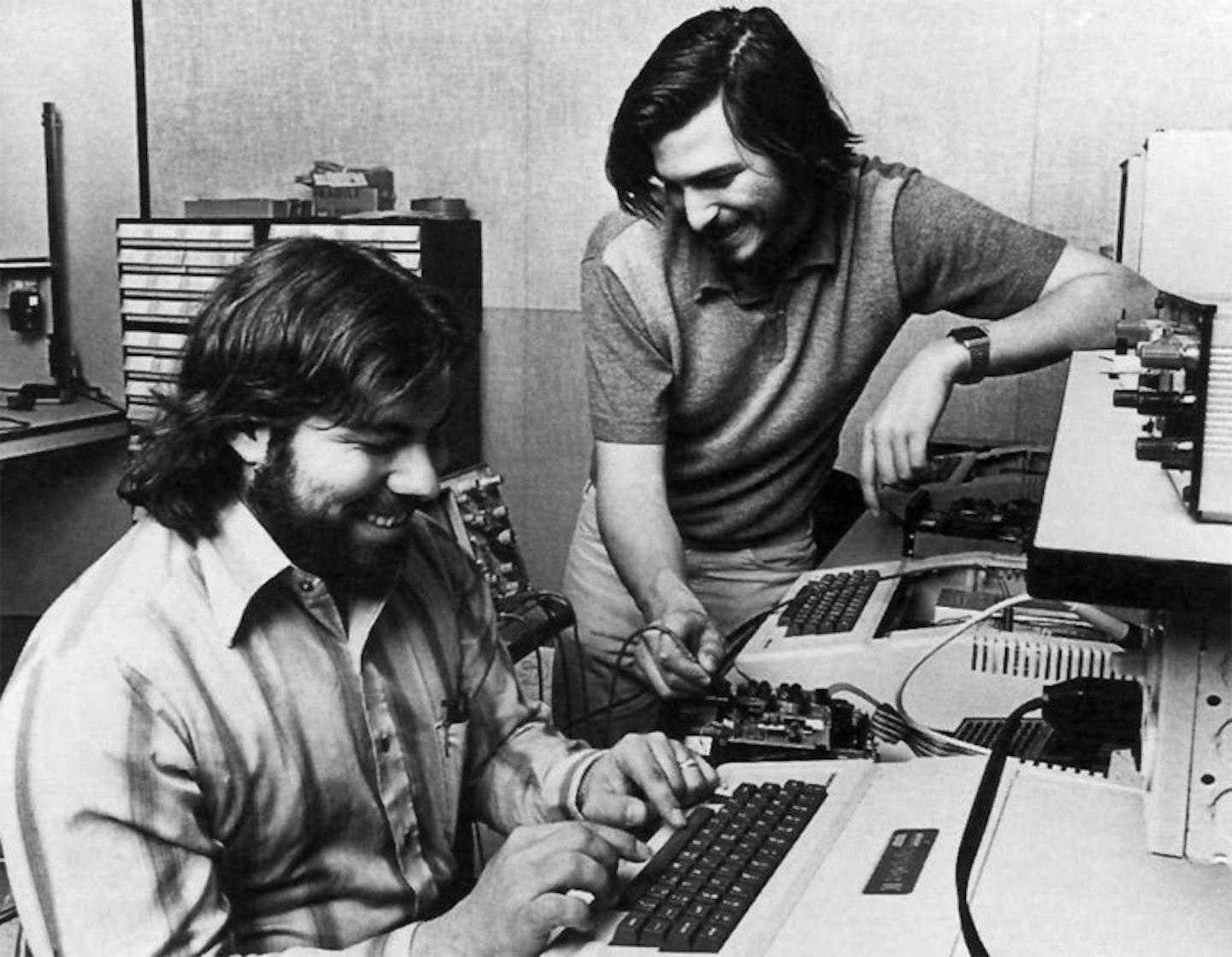The utterly bonkers life of anti-virus software pioneer John McAfee is now the subject of two movies in development – and we started wondering which other figures of tech would make for good biopic fodder. After all, once you’ve got their exciting story all you need to finish the movie is your mum’s permission to shoot in the garage, a tiny budget for outdated computers and a bunch of ratty hoodies. We take a look at the fascinating stories behind some of the tech world’s biggest names…
You might not think that someone who began his career working for NASA’s Institute For Space Studies in New York and then Lockheed would end up a paranoid oddball on the run from the authorities. But then not everyone is John McAfee.
You probably know him best as the man behind one of the best-selling anti-virus programmes, to which he gave his name – a sure sign of a healthy ego looking for an outlet. In a blend of both canny market awareness and luck, McAfee’s product arrived as the need for virus software blew up like Violet Beauregarde in Charlie And The Chocolate Factory. After making a fortune hunting down and removing trojans, worms and nasty invaders, McAfee cashed out of McAfee Associates and moved to Belize to start working on other start-ups.
That’s when things went a little haywire. In April of last year, the local gang suppression unit raided his property. Turns out he’d been busy doing a Heisenberg – or for non-Breaking Bad fans, manufacturing unlicensed drugs. And it seems that earning all that money had simply increased his innate paranoia and wayward tendencies. He was living the girls & guns high life, but had forgotten the legal ramifications.
Increasing the confusion was the fact that fellow US expatriate Gregory Viant Faull was found dead of a gunshot wound, a crime for which McAfee was hauled in as a person of interest, though no one was charged. McAfee fled Belize for Guatemala, pleaded for asylum, faked a heart attack and was eventually deported back to the US last December.
He’s an experienced yoga teacher, which makes us seriously question the calming benefits of sweaty stretching. Worst of all, he claims he never uses the anti-virus software that bears his name, as he finds it “too annoying.” You and the rest of us, mate.
We’d cast: Johnny Depp in full-on charismatic oddball mode.
Tone: Quirky indie drama - think Fear & Loathing meets The Rum Diaries meets Blow.

If you thought John McAfee was a little full of himself, he’s a paragon of modesty next to Kim Dotcom. You’ll be shocked to learn that this hacker-turned-mogul wasn’t born with that moniker, but instead grew up in Germany as Kim Schmitz.
Riding a wave of publicity about his skills, he boasted of great achievements early in life, relying mostly on the gullible German press who in 1992 were far less savvy about such things as Sneakers-style hacking of phone banks and codes. One of Kim’s big early tricks was buying stolen phone code cards and setting up premium lines, then using the codes to call the lines and pocketing the profits.
He parlayed what he’d earned into creating companies, including an early stab at what would become his biggest success/nightmare for businesses: file sharing. Warring with telecom companies, the record industry and more than one government, he slowly built a legend around himself, indulging in the rich life of custom cars, big houses and even making promotional films about “Kimble”{
With his company Data Protect doing well, he launched other ideas and kept his cult of personality going by posing in parked planes and acting like he owned them. Selling a stake in Data Protect, he began playing the tech bubble for all it was worth, pledging to invest in one company before cashing out just as it crashed. Hello, insider trading charges! But the lure of file sharing wealth proved too great and he set up one of the biggest websites around, while also changing his name to Kim Dotcom. Classy.
Sadly for both Dotcom and Megaupload (as Data Protect became), the US government eventually became very interested in chasing pirates. The site was raided and Dotcom moved to New Zealand to enjoy his money. He’s since claimed he’s going totally legitimate with his new site Mega, but the US authorities are still trying to extradite him…
We’d cast: Ethan Suplee, in a fat suit since he lost all that weight.
Tone: Project X-style anarchy pic.

Since it began, the Pirate Bay has waged a one-website assault on copyright and some of the biggest entertainment industries. Oh, and porn sites. Because we all know that’s what the Internet thrives on. Well, that and cats in boxes/on treadmills/getting their first taste of snow, though you don’t generally need a bit torrent site for those.
Unsurprisingly, the lawsuits have flown thick and fast, including the big one in 2009 when co-founders Peter Sunde, Fredrik Neij, Gottfrid Svartholm and Carl Lundstrom were found guilty of assistance to copyright infringement and sentenced to a year in prison with an additional fine of 30 million Swedish Krona (about £2.8 million). They appealed, but lost. The sentence was reduced, but the fine was raised to 46 million Swedish Krona.
Various governments (including the UK) have tried to block the site, not quite realising that for every attempt to deny access, there are a hundred ways around it. Sometimes you have to wonder if people in authority really understand how this series of tubes works.
Several attempts have been made to raid the site’s offices or take its servers down, but the Pirate Bay gang have always rebounded. They’ve also extended their tentacles out far beyond the file-sharing site, launching attempts to buy a micro nation. When that failed, they raised thousands in donations to try to buy an island instead.
And they’ve also moved into politics, forming the Pirate Party to argue on behalf of their beliefs. One day, you can almost imagine them building a massive, fully operational space station hanging in orbit around the planet….
We’d cast: Alexander Skarsgard, Stellan Skarsgard, Dolph Lundgren, Michael Nyqvist – and er, any other Swedish actors we can think of.
Tone: Paranoid conspiracy thriller (Dragon Tattoo optional), perhaps with a optimistic-despite-it-all ending for the (anti)heroes.
Our story starts in the stone halls of Magdalene College, Oxford, where young Martha Lane Fox studied ancient and modern history. Not a natural beginning, you might think for someone who would end up co-founding one of the biggest dot-com companies in the UK. But after university, she found her true calling. Consulting! Which led to a project for British Telecom called What Is The Internet? You’ve got to remember that this was pre-1998 and people didn’t really seem to know.
While consulting, she met Brent Hoberman and her life changed forever. Together the pair founded Lastminute.com in 1998, a site for travel and gift deals that generated massive publicity and even bigger profits just as the dot-com bubble began to really grow. It even managed to survive the subsequent burst, and was sold to Sabre Holdings for £557 million. Lane’s personal share? £13 million.
For most people, that would be retirement money, but she wasn’t finished. She went on to help run Selfridges, and in 2005 was approached with an idea to set up a private, Tokyo-style karaoke bar in London. A favourite Empire haunt was born in Soho, along with a chain of Lucky Voice bars around the country, a computer application and more.
In 2009, she was made the Government's Digital Inclusion Champion, looking to make us all more computer literate. She also sat on several charity boards and helped rescue the Orange Prize For Women’s Fiction when the telecom company backed out of supporting it.
To add some action to the financial drama, everything since 2005 has been achieved despite a traumatic jeep accident in Morocco that resulted in life-threatening injuries. She has so much metal supporting her body that you might as well call her Wolverine. But for now, the nickname her brother gave her, Fast Lane Fox, seems to fit just as well.
We’d cast: Emily Mortimer with a blonde dye-job.
Tone: Plucky Erin Brockovich-alike biopic.

Hard luck has played a big part in Jack Tramiel’s life, and his enduring spirit is something of an inspiration. Some tech pioneers have a slightly interesting story. Then there’s Jack.
Born Jacek Trzmiel in Poland in 1928, his Jewish family was transported to the local ghetto when Germany invaded in 1939, and Tramiel worked in a garment factory. From there, they were taken to Auschwitz and he and his father were dispatched to the Ahlem labour camp while his mother remained behind. The US Army liberated the camp in 1945, and he saw his future, enlisting two years later, training in office equipment repair. The seeds of his future business were sown.
After settling in the US and working as a taxi driver (a very common immigrant profession, that), he earned the money to buy a shop in the Bronx and start once more repairing office machinery. He named it Commodore Portable Typewriter. When that evolved to manufacturing adding machines Tramiel faced a big problem, in that it was eventually all but wiped out by the arrival of calculators from Japan. After securing financing to by another company, he was told by its chief designer, Chuck Peddle, that computers were the future. Tramiel asked him to prove it.
The result was the Commodore PET, which became a huge sensation at first. As seems usual in Tramiel’s career, other companies began to catch up and overtake them, leading to the development of the Vic-20 and then the world famous Commodore 64.
In 1984, Tramiel pulled a Steve Jobs and resigned from the company he founded, and created Tramel Technology, which ended up buying Atari, Inc. He died at the age of 83 of heart failure. Not a bad life for someone whose world started out in such chaos…
We’d cast: If only Ed Asner or Wilford Brimley were 20 years younger. Robin Williams with some prosthetics?
Tone: Perhaps a lighthearted drama with extensive, darker flashbacks, for an upbeat feel but an emotional punch.
Growing up the son of a British father and a Polish mother in India, Osbourne in enjoyed a lavish, pampered early life. But at the age of 11, the family relocated to the UK, which was a massive culture shock.
Osbourne became interested in technology early, and frequented the well-known Homebrew Computer Club (the American version spawned Steve Jobs and Wozniak, among others). His big breakthrough was creating the first commercially available portable computer, known as the Osbourne 1. It was a huge hit and, at its peak, was shipping 10,000 units a moth at a cost of $1795 each. Cannily, Osbourne had spotted a gap in the market for computer users who were not the hobbyists usually interested in tinkering with the devices, but instead needed to use it for business. So his machine came loaded with spreadsheet and early word processing software. Fortunately this was many years before the invention of Clippy, that cursed Microsoft paperclip.
Sadly, Osbourne’s ego got the better of him, and his bragging talk of the next machines his company was developing shot the legs out from the market for the Osbourne 1. In fact, the problem of a new technology destroying demand for older versions is now known as the Osbourne Effect, a lesson Apple today would do well to learn if it is to keep selling iPads. Still, that wasn’t the only problem - thanks to problems with management and other issues, the company filed for bankruptcy in 1983.
Osbourne moved on to creating computer manuals and affordable software. But one popular title, which shared similarities with the famous Lotus 1-2-3 system, resulted in a lawsuit and more problems for Osbourne’s Paperback Software company. But though he stepped down from the company, it continues to trade. He died in India aged 64.
We’d cast: Paul Rudd with sideburns and a moustache.
Tone: Tragi-comic, with a Man On The Moon feel.

Yes, he’s been played on screen before, in a little film you might have heard of called The Social Network. But those who know him have claimed that Sean Parker was a very different man to the personality embodied by Justin Timberlake.
The real-life Parker got into computers young after his father taught him how to program an Atari 800. That led to hacking, but he channelled his interests into more legal means. Well, mostly. He began setting up companies during his senior year, interned for Internet start-up Zynga and won the Virginia state computer science fair.
By the time he graduated, Parker was earning $80,000 a year from his various companies, and his parents agreed to let him skip college and become an entrepreneur. They may have regretted the decision after Parker co-founded Napster with Shawn Fanning, who he met over the Internet when he was 15 and Fanning was 14. The file-sharing service became the fastest-growing company of all time with just one teeny, tiny problem: it breached copyright all over the shop. Eventually, the Recording Industry Association of America (and metal growlers Metallica) sued to have it shut down.
Parker moved onto social networking tool Plaxo, but that ended with him forced out and private investigators hired by the other investors to follow him. He rebounded by becoming part of a little site he saw on a roommate’s girlfriend’s computer called Thefacebook, and the rest on that one is cinematic history. More recently, Parker re-entered the world of music sharing, taking trouble to find something legal and ended up investing in Spotify. He’s also been developing live video website Airtime with Fanning.
Parker, Fanning and Napster’s story is set to be told once more in Alex Winter’s documentary Downloaded, which premiered at last year’s SXSW festival and has a trailer available to watch.
We’d cast: Jesse Eisenberg, just to mess with everyone’s head.
Tone: Bit of a Wall Street clone, perhaps.

Steve Jobs* (pictured right)* might be the most famous name to emerge from the history of Apple, but Stephen Gary Wozniak deserves a place right there with him, sowing the seeds.
Wozniak met Jobs and bonded in 1970 when the former was working for Hewlett Packard and the latter got a summer job there. Woz is the one who actually designed and developed the circuit board designs, hardware and operating system for the Apple I. The pair finessed their creation and ended up selling the first 50 units for $666.66 (they weren’t Satanists, just fans of repeating digits). That original computer had an astonishing 256 bytes of ROM and 8 KB of RAM. You kids don’t know how good you have it. We remember when all this was fields, etc.
After that came the Apple II, which broke new ground with the ability to display colour graphics. It quickly became one of the first successful mass-produced personal computers.Flying high on the back of Apple Computer, Wozniak’s life took a somewhat literal nosedive on February 7, 1981 when the plane he was piloting crashed, injuring all aboard. He spent his recovery time and years afterwards pioneering festivals to celebrate music and technology and returned to UC Berkeley to finish his undergraduate studies.
He ended full-time work at Apple in 1987, 12 years after helping to create it in the first place. He’s still an employee and earns a “modest stipend”, which is estimated at $120,000 a year and somewhat redefines the word “modest.” He also owns Apple stock.
Post-Apple, he’s been a teacher, founded other companies and generally been regarded as a quirky genius beloved by the tech community. He’ll crop up on screen this year in Joshua Michael Stern’s jOBS, which charts the early years of Jobs. Ashton Kutcher ‘s playing the title character and Josh Gad appears as Wozniak. Long live the Woz!
We’d cast: Wozniak himself, who did after all play himself on The Big Bang Theory.
Tone: Capra-esque story about how to get ahead in business without being a terrible person.